Maghaberry Prison 'most dangerous' ever visited says chief inspector
- Published
Nick Hardwick, Her Majesty's Chief Inspector of Prisons in England and Wales, said Maghaberry is the most dangerous prison he has inspected in his role
Northern Ireland's high security Maghaberry Prison is the most dangerous prison ever inspected by Her Majesty's Chief Inspector of Prisons in England and Wales.
Nick Hardwick was detailing the findings of a report into the prison. , external
It was jointly compiled by Mr Hardwick and Brendan McGuigan, chief inspector of Criminal Justice NI.
Inspectors visited Maghaberry in May and found it in a "state of crisis".
They found it was "unsafe and unstable" for prisoners and staff.
The report is one of the most critical of any prison in the UK.
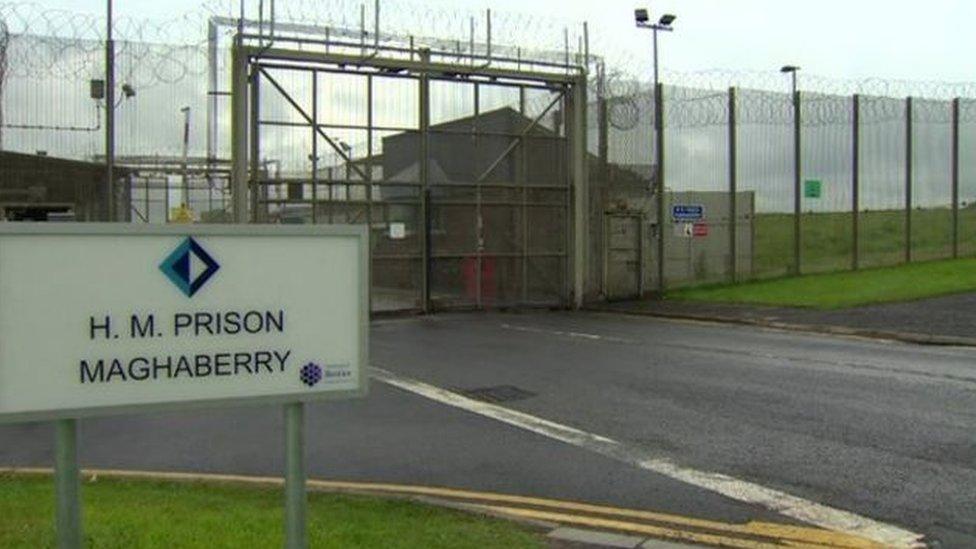
A team of more than 20 inspectors spent almost two weeks assessing conditions at Maghaberry Prison, near Lisburn, in May
It said there were significant failures in leadership.
Prison practices 'crazy' says officer
Maghaberry Prison: A timeline of reports and inquiries
Ex-prisoner slams jail's medical care
Mr Hardwick said the prison was the "most dangerous prison" he had ever been in during his time as a chief inspector.
"It's not safe for the prisoners health, it's not safe for the staff who care for them and it's not safe for the communities into which these men will be returned with very little done to reduce the risk that they will stop offending," he told a press conference on Thursday.
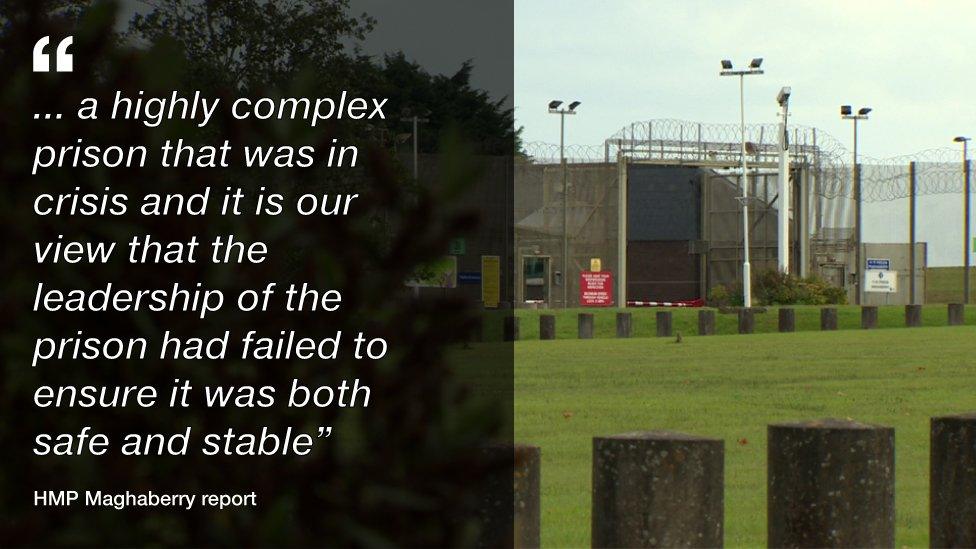
He described it as a "very worrying and disturbing public institution" and said Charles Dickens could write about Maghaberry "without batting an eyelid".
'Complex prison'
Mr McGuigan said their report on Maghaberry was the "most concerning ever" regarding a prison in Northern Ireland.
"What we found was a highly complex prison that was in crisis and it is our view that the leadership of the prison had failed to ensure it was both safe and stable," they said in a joint statement.
"We had real concerns that if the issues identified in this report were not addressed as a matter of urgency, serious disorder or loss of life could occur."
A team of more than 20 inspectors spent almost two weeks assessing conditions at Maghaberry in May.

Analysis: BBC News NI Home Affairs Correspondent Vincent Kearney
Reports criticising conditions within prisons in Northern Ireland are nothing new.
But this one is in a different league. It is by far the most critical ever published.
A prison described by the government's chief inspector of prisons as the most dangerous he has ever set foot in.
Read more of Vincent Kearney's analysis here.

Northern Ireland's Justice Minister, David Ford, said action was already under way to address the issues raised in the inspection report. Mr Ford also said he does not intend to resign after the report.
In addition to the two criminal justice organisations, the health watchdog, the Regulation and Quality Improvement Authority and the Education and Training Inspectorate, were also involved.
Inspectors measured Maghaberry's performance against four internationally recognised criteria: safety, respect, purposeful activity and resettlement.
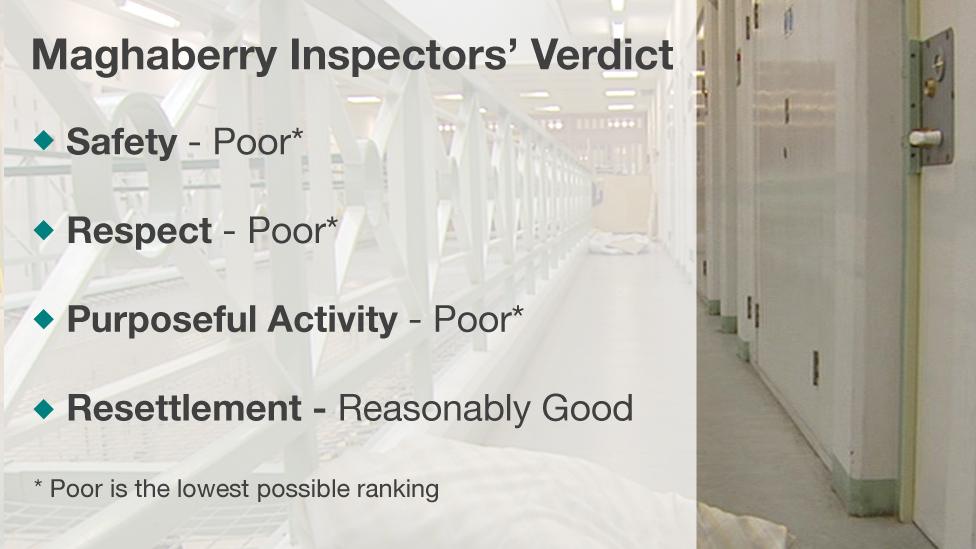
In three of those areas, safety, respect, and purposeful activity, the inspectors labelled performance as "poor", the lowest possible ranking.
In the area of resettlement, they described performance as "reasonably good".
Credible threats
It said far more prisoners than in previous inspections said they felt unsafe and drugs were more widely available.
It also said some staff were the subjects of credible threats, with some fearful of prisoners.
Staff absence during the period of the inspection was described as high.
David Ford has had, at times, a testy relationship with the press
As a result, substantial numbers of prisoners were spending long periods of time locked in their cells, limiting access to education, showers, opportunities to make telephone calls to family and friends and to carry out everyday domestic tasks.
The inspectors said this "contributed to the overall instability of the prison".
The report also said levels of assaults and rates of self-harm among prisoners had increased, with inspectors told "a great deal of bullying and incidents of physical violence, were going unreported".
It is also critical of the regime in a small section of the prison for dissident republicans, who are held in a separate unit, called Roe House.
'Negative impact'
They account for just 5% of the overall prison population, but a much greater proportion of the resources, with staff from other areas often diverted there.
"Giving preference to maintaining the regime for separated prisoners over every other area in the prison is unfair and has a negative impact on more than 900 men who make up the majority of the prison population," the report said.
"This position is untenable and a radical new approach is now required.
"To assist with this process we recommend that should it remain necessary to manage the separated units in this way, their location, management, and resources should be treated as stand alone to that of the main prison."
The report was also critical regarding the provision of health care in the prison.
"Inspectors were very concerned that aspects of health care provision had deteriorated since the previous inspection," the report added.

Brendan McGuigan, chief inspector of Criminal Justice NI, said their report on Maghaberry was the "most concerning ever" regarding a prison in Northern Ireland
"In our view it was falling short and not meeting the complex needs of the prison population.
"Some areas of health care including chronic disease management and substance misuse, were considered by inspectors to be unsafe."
The inspectors were so concerned by what they found in Maghaberry that they have taken the unprecedented step of announcing they will go back in January to assess the response of the prison service to its findings.
They also called on Northern Ireland's politicians to read the report and take "urgent action".
- Published5 November 2015
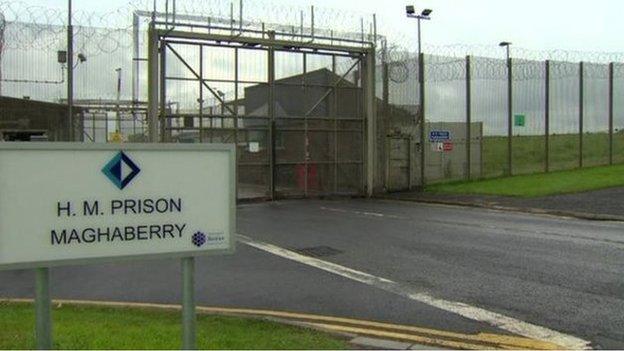
- Published5 November 2015

- Published5 November 2015
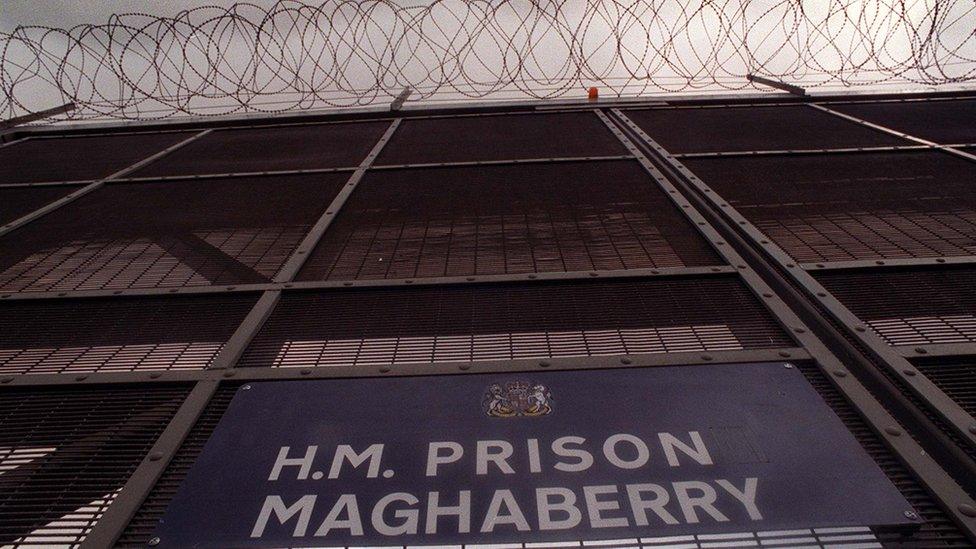
- Published5 November 2015
